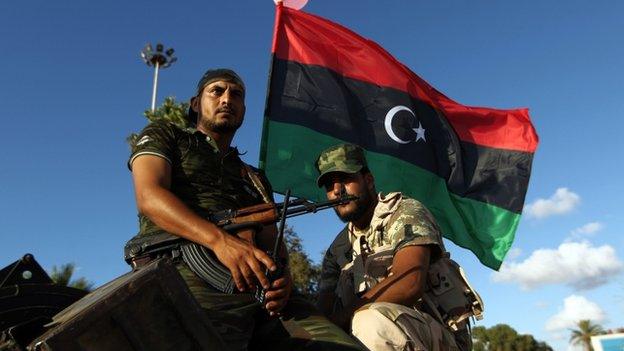Lockerbie truth buried in Libyan chaos
- Published
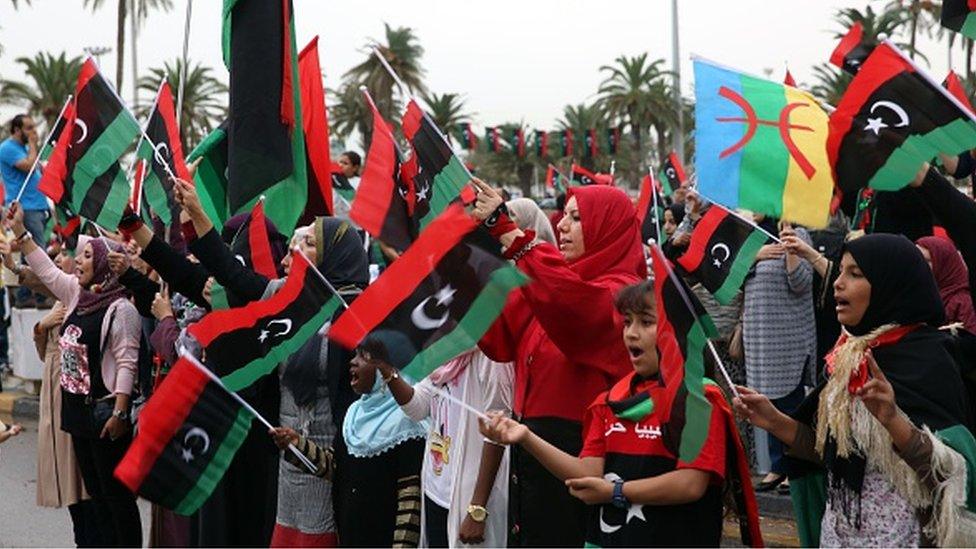
Libyans in Tripoli celebrate the anniversary of Colonel Gaddafi's death
Today, Libya is a deeply divided, war-torn country which is apparently in a state of near-collapse.
It has two rival governments, based in different cities 1,000 miles apart, each insisting it deserves international recognition.
So how do you set about investigating the murder of a US ambassador here - or the destruction of a passenger aircraft, external with massive loss of life?
The short answer is that you don't. Unless, that is, you are prepared to compromise your principles and deal with the realities on the ground.
The self-styled National Salvation Government (NSG) is based in the capital, Tripoli, and controls large amounts of territory in Libya.
It pays - or at least is responsible for paying - the salaries of policemen, soldiers, teachers and civil servants right across the country.
But the international community refuses to recognise the NSG because it lost the most recent election, in June 2014.
The group which won a parliamentary majority is based in the eastern town of Tobruk and is known as the House of Representatives (HoR).
Its area of control is small, and its reach extremely limited.
But it has received the recognition of the United Nations.
So when the Scottish government made the first moves to interrogate the two men it (like the US government) believes were behind the Lockerbie bombing in 1988, it applied to the internationally accepted HoR.
John Simpson: "Scotland and America may have to choose between dealing with a government they don't recognise or waiting for peace to come"
But Mohammed Abouajela Masud, an explosives expert, and Abdullah al-Senussi, Colonel Gaddafi's brother-in-law and intelligence chief, aren't under the control of the government in Tobruk.
They are being held far away to the west, in al-Hadba gaol in Tripoli.
Like everything else here, al-Hadba is controlled by the NSG.
So while applying to the Tobruk government for access to the two men may be the right thing to do in terms of international law, it is totally useless in practice.
Snubbed internationally
When I met the justice minister in the Tripoli government, Mustapha al-Glaib, he spoke with the precision he had learned during his years as a judge.
"We consider ourselves to be the legal government of Libya," he says.
"We try to co-operate with the international community, but it doesn't want to deal with us."
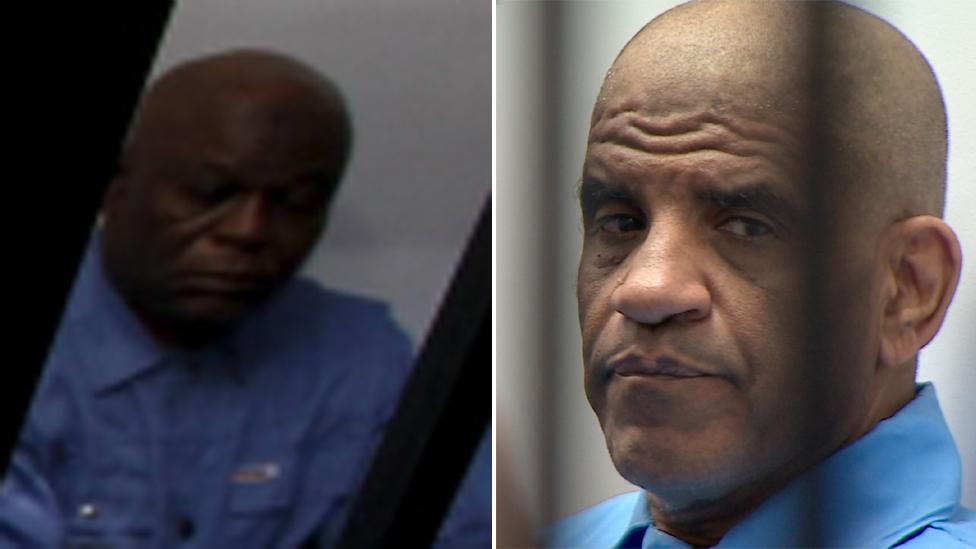
Mohammed Abouajela Masud and Abdullah al-Senussi have been named as suspects in the Lockerbie bombing
He is right about that. The complex, violent, faction-ridden situation in Libya means that the outside world, and particularly Europe and the US, is reluctant to get too deeply involved here.
Almost all the foreign embassies in Tripoli are closed.
So are all the big international hotels. The smaller one where my team and I are staying is almost entirely empty.
You never see a Western face in the streets here.
The international airport has been comprehensively destroyed in the fighting.
Several dozen passenger aircraft, all previously in regular use, are now lying around wrecked or burned out.

Lockerbie bombing:
21 December 1988: Pan Am Flight 103 from London to New York explodes 31,000 feet over Lockerbie, 38 minutes after take-off from London. The 259 people on board the Boeing 747 are killed, along with 11 people on the ground.
31 January 2001: Abdelbaset Ali al-Megrahi is found guilty of murder after a trial under Scottish law in the Netherlands.
20 August 2009: The Scottish government releases Megrahi on compassionate grounds. He returns home to Libya aboard a jet belonging to Libyan leader Muammar Gaddafi.
20 May 2012: Abdelbaset al-Megrahi dies at his home in Tripoli, aged 60, still protesting his innocence.
15 October 2015: Scottish prosecutors request permission from the Libyan authorities to interview two suspects over the Lockerbie bombing.

Getting to Tripoli is a difficult and complex logistical exercise.
For the outside world, it is almost as though the city has ceased to exist.
And yet events have combined to give it considerable importance at the moment.
Ignoring Tripoli and the government here simply makes everything to do with Libya much harder.
Operating here certainly isn't easy.
The economy seems to be close to collapse and crime is rising.
In particular, there has recently been a spate of violent kidnappings - particularly of businessmen and shopkeepers.
Yet the NSG continues.
Everything still works after a fashion, though there are frequent power cuts.
Plenty of shops and cafés are closed in the city, yet people still turn up for work.
The streets are always blocked with cars at rush hour.
No unity
The policy of appealing to the two rival governments to come together and sort out the situation has so far failed.
Last Tuesday was the time the UN had set for the HoR and the NSG to form a united government.
The deadline came and went, with no change.
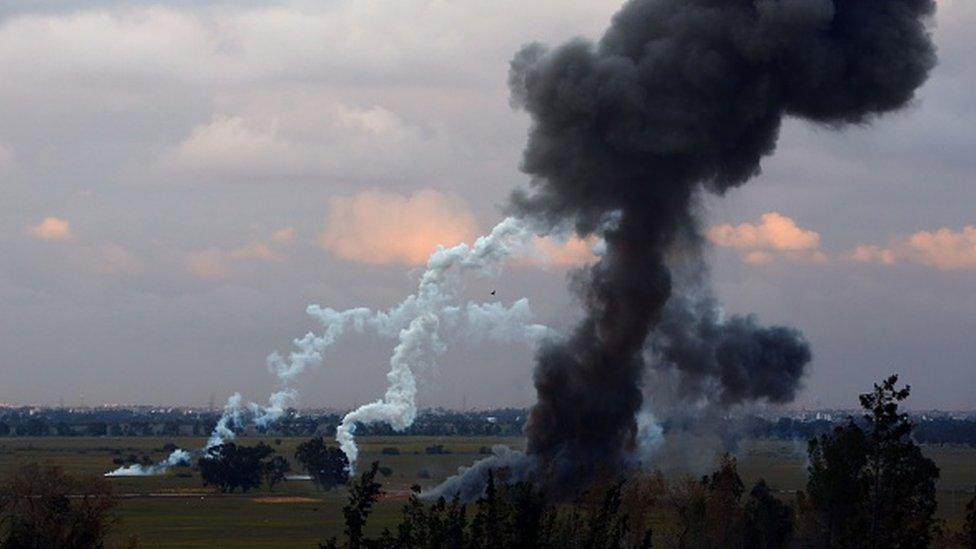
The airport in Tripoli has been wrecked during fighting
As the former US secretary of state Hillary Clinton found in the aftermath of the murder of the US ambassador in Benghazi, external, the lack of US officials on the ground made any kind of investigation much harder and less reliable.
Now the US and Scottish authorities want to investigate the Lockerbie bombing further.
Officials of the NSG have made it clear that they will co-operate with any new enquiries.
But they are adamant that it has to be done according to Libyan law.
Perhaps the Tripoli government sees all this as a way to persuade the international community to give the NSG some degree of recognition.
It wouldn't solve the wider problem of who governs the country, but it might make life a little easier.
- Published16 October 2015
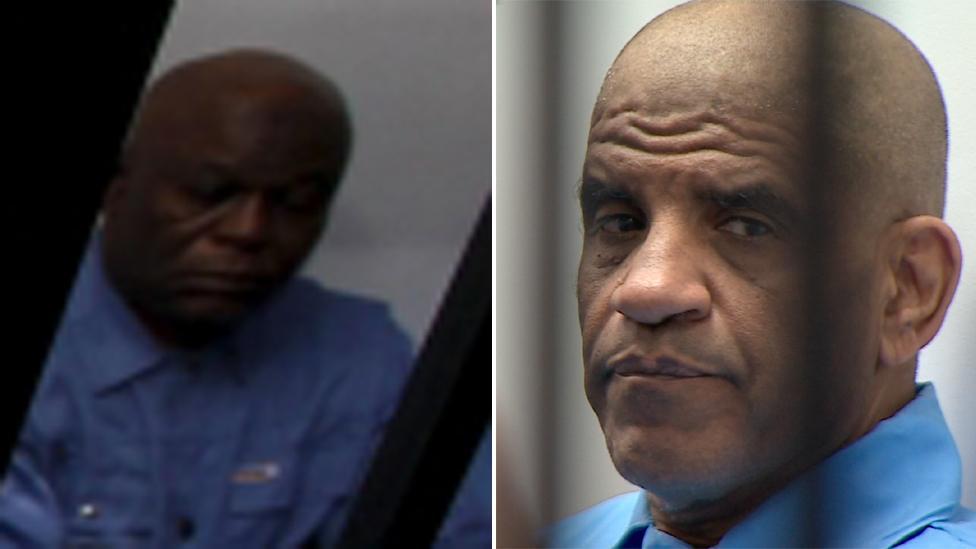
- Published3 September 2015
